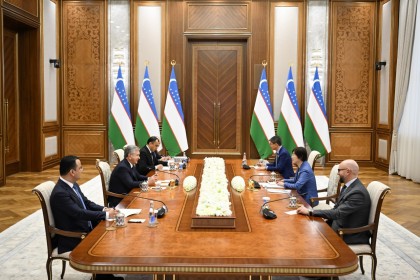On 3 June, the Steering Committee of the Multi-partner Human Security Trust Fund for Aral Sea Region (the MPHSTF) reviewed proposals received under its First Call for Proposals.
The meeting was co-chaired by the Deputy Prime Minister of Uzbekistan Mr. Elyor Ganiev and the UN Resident Coordinator in Uzbekistan Ms. Helena Fraser.
The first Call for Proposals under the MPHSTF was focused on providing environmental security, including afforestation; health security; and social security, including access to basic utilities, social protection, water, sanitation, and education.
In total five project proposals were received from Participating UN Organizations (PUNOs) for a total amount of US$4.23 million. Following the review and consultations, the Steering Committee consisting of the government representatives (including Karakalpak authority), donors (i.e., EU Delegation, the Embassy of Japan), local NGOs, and the UN, approved two project proposals for the total amount of US$3.085 million.
Earlier this year, the governments of Uzbekistan and Norway contributed US$2 million and US$1.1 million to the fund each.
The first approved proposal aims to improve the quality of perinatal care service to most vulnerable mothers and newborns, benefiting estimated 26,000 pregnant women and newborns in Karakalpakstan, while 500 medical workers are expected to improve their skills through dedicated training programmes. The project will be implemented by UNICEF and UNFPA jointly with the Ministry of Health of the Republic of Uzbekistan.
The second is to be implemented by UNDP and UNESCO in cooperation with a variety of local and national stakeholders, aims at tackling multiple dimensions of human security, such as providing access to drinking water for 2,500 rural people, expanding income generation opportunities through support to SMEs and eco-tourism development (benefiting 250 men and women), as well as afforestation in the remote regions of Karakalpakstan (with direct beneficiaries estimated at 1850 people, and indirectly benefiting more than 300,000, people). The implementation of the projects is expected to start in July 2019.











